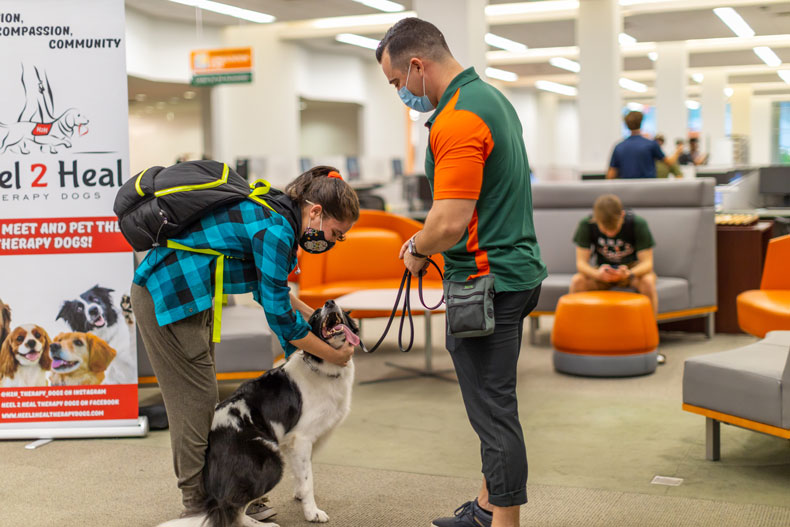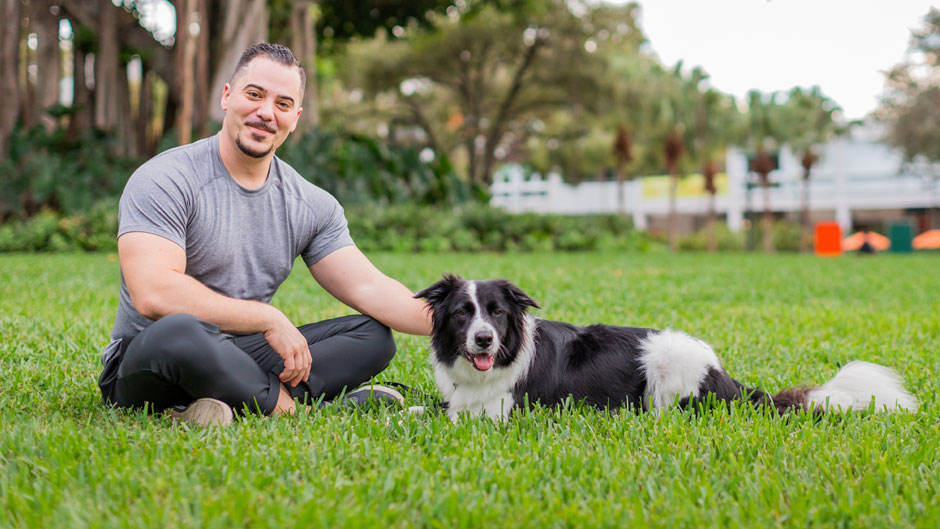Not long after Brian Galea adopted a 1-year-old border collie from a foster home in Cleveland, he threw himself into learning everything he could about training dogs. He had no choice because, as the University of Miami double alumnus recalled, Dash was “an absolute wreck.”
“He had every fear in the book. He literally could not walk over a manhole cover. He hated skateboards, loud cars, weights dropping on the gym floor,” said Galea, an adjunct lecturer in human anatomy who earned his MBA in May after realizing he had been chasing the wrong career. “If I took him to a store and the P.A. system came on, he would freak out.”
Six years later, Dash has traded his fears for a crowd-pleasing skill set. He’s a certified therapy dog who hugs strangers—and can fetch and deliver a soda from the fridge—on cue. And Galea is at peace with his decision to cast aside his dream of becoming a physician and concentrate on turning Snoot, the dog-training app he founded while at the Miami Herbert Business School, into a national platform that unifies all aspects of dog training and ownership.
“I had the idea before I started, but it evolved radically and became more directed as I talked to more professors over the course of my MBA,” said Galea, who helped launch the ’Cane Angel Network, which connects University-affiliated startups with early-stage investors. “I jokingly say that I absolutely got my money’s worth from my tuition by getting all this free consulting.”
Now available for free at the app store, Snoot is ready to provide new dog owners who adopted their pets from animal shelters or other rescue organizations with curated, research-based information designed to help them raise happy, healthy, and well-adjusted companions. Organized under such topics as food and health, socialization and manners, barking and chewing, and the ever-important potty training, the app’s self-paced, positive-reinforcement lessons include step-by-step videos and corresponding product recommendations that, Galea said, enables Snoot to offer its information at no cost.
So far, a handful of canine rescue operations have agreed to encourage people who adopt one of their dogs to use the app. Miami-Dade County Animal Services, which facilitates more than 1,000 dog adoptions every month, is among them and Galea expects many more to follow. Last week, he introduced Snoot to 8,500 rescue operations across the nation.
And soon, new dog owners will be able to find and book a dog trainer through Snoot, a service which the Certification Council for Professional Dog Trainers (CCPDT) has agreed to share with the nearly 5,000 dog trainers and behavior consultants the organization has tested and certified since its 2001 inception.
“First, we want to get to people when they need Snoot the most—in the vulnerable days and weeks after they’ve rescued a dog,” Galea said, explaining Snoot’s market strategy. “We want them to have high-quality information that is supported by the most reputable organizations in the dog industry—by the CCPDT, by the American Kennel Club, by the American Veterinary Medical Association. And, of course, the shelters they got their dog from. Then we’ll get the trainers—because Snoot will have value and they’ll want to be part of it.”
But his vision doesn’t stop there. Noting that anyone can hold themselves out to be a dog trainer, Galea sees the day when Snoot will become a motivating force in creating standards and licensing requirements for dog trainers. “Right now, dog training is a very weird, wild west sort of industry,” he said. “Anybody can get into it. Anybody can advertise. There is no way to know what you’re getting, and usually dog owners don’t even know to ask about credentials or methods—which is something that I really want to fix.”
It would, though, take years for Galea to recognize the value of his idea, and the potential for expanding it into what he calls “the ultimate dog-owner’s guide to everything.” After earning his B.S. in biology from the U in 2012 and working as a research assistant for two years at the Miller School of Medicine, he headed to Case Western Reserve School of Medicine in Cleveland, where he earned his master’s degree in human anatomy with the goal of going to medical school. But when his previous dog died, he set out to adopt a border collie and, when he found Dash, he unknowingly found his calling.
“His name was Rupert, and he was living on a farm in the boonies. And when he saw me, he wiggled over, dropped at my feet, and rolled over for me to pet him. I almost cried because it was only a month after my previous dog died and I just needed a friend,” Galea recalled. “His foster mom asked, ‘Do you want to see the others?’ and I said ‘No, this is my dog.’ But it was soon very clear he had all these issues. He was afraid of every noise on campus.”
After returning to Miami, Galea began teaching human anatomy at the School of Nursing and Health Studies, applying to medical schools, and taking Dash to all the dog-training classes he could. They were such a good team that Dash soon became a certified therapy dog, and Galea a certified therapy dog tester through the Alliance of Therapy Dogs.
Before long, he co-founded Heel 2 Heal Therapy Dogs, a nonprofit that sends volunteer therapy dog teams to medical and other venues across South Florida—including the University’s Richter Library, where stressed students facing final exams were delighted to see Dash last week. Galea also gained his certifications as a professional dog trainer and canine behavior consultant and established his own personal dog-training business. Then, slowly but surely, he began doubting his plan to pursue a career in medicine.

“It took me a long time because I had invested so much in it and it felt like quitting,” Galea said. “But I couldn’t stop doing the training because it’s teaching. And I love teaching. And dogs are super fun, and I love the psychology and science behind training them. But there wasn’t a lot of money in it, and it wasn’t prestigious.”
Eventually, those excuses made Galea realize he had been pursuing medicine for the wrong reasons and—intrigued by Miami’s burgeoning startup ecosystem—he decided to earn his MBA and become an expert in venture capital (VC). But, as he helped develop the initial screening processes for early-stage startups in the inaugural ’Cane Angel Network class, he kept his idea for Snoot in his back pocket and kept refining it as he talked to more and more professors.
Then, as an active member of the Graduate Student Association (GSA) and the graduate student representative on the Board of Trustees, Galea began organizing and moderating a networking series between alumni panelists and GSA members. That’s how he met fellow double alumnus David Mullings, the founder of Blue Mahoe Capital, an investment firm primarily focused on the Caribbean, who was happy to share his experiences with the GSA—and eventually help realign Galea’s priorities.
After graduating with his MBA, Galea reached out to Mullings, thinking he’d be a good contact for VC jobs. But when Galea mentioned this “little side thing” he was working on, Mullings encouraged him to forget about VC and follow his heart. “It was clear he had a solution to a problem that will make people’s lives better, but more importantly, he was passionate about it,” Mullings said. “And that’s why his business model has the potential for success—because it’s scalable and he has the passion to push through the dips and potholes he’ll face.”
He also has Dash, who taught him other priceless lessons. “He gave me so much more than what I was looking for,” Galea said. “He taught me the joy of playing with dogs and making a living doing it.”

